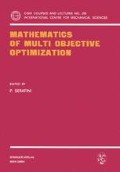Abstract
Interactive multi-objective linear programming methods are based on three different types of scalarizing functions. In this note we discuss the amount of information to be given by decision makers for each of these types. We show that in many methods the ability of a decision maker to oversee a large number of stimuli is overestimated.
Access this chapter
Tax calculation will be finalised at checkout
Purchases are for personal use only
Preview
Unable to display preview. Download preview PDF.
References
Zionts, S. and J. Wallenius. An interactive multiple objective linear programming method for a class of underlying nonlinear functions, Management Science, 1983, vol. 29, no. 5, p. 519–529.
Spronk, J., Interactive Multiple Goal Programming; Applications to financial Planning, 1981. Martinus Nijhof, Boston.
Chankong, V., and Y.Y. Haimes. The interactive Surrogate-Worth Tradeoff (ISWT) method for multiobjective decision-making, in S. Zionts (ed.), Multiple Criteria Problem Solving,Springer, Berlin, etc., 1978, p. 42–67.
Wierzbicki, A.P.. The use of reference objectives in multi objective optimization. Theoretical implications and practical experiences. IIASA, WP 79–66, 1979, Laxenburg, Austria.
Steuer, R.E., and E.U. Choo, An interactive weighted Tchebycheff procedure for multiple objective programming, Mathematical Programming, 26, 1983, p. 326–344.
Zeleny, M., Linear Multi-Objective Programming, Springer, Berlin, 1974.
Benayoun, R., Montgolfier, J. de, Tergny, J., and Larichev, 0.I., Linear Programming with multiple objective functions: STEP method (STEM), Mathematical Programming 1, 1971, p. 366–375.
Kok, M. and F.A. Lootsma, 1984. Pairwise-comparison methods in multi-objective programming, with applications in a long-term energy-planning model. Report of the Department of Mathematics and Informatics, 84–19, Delft.
Kok, M., The interface with decision makers in interactive multi-objective linear programming methods, Report of the Department of Mathematics and Informatics,1984, Delft.
Payne, J.W.. Task complexity and contingent processing in decision making: an information search and protocol analysis, Organizational Behavior and Human Performance, 16, 1976, p. 366–387.
Author information
Authors and Affiliations
Editor information
Editors and Affiliations
Rights and permissions
Copyright information
© 1985 Springer-Verlag Wien
About this chapter
Cite this chapter
Kok, M. (1985). Scalarization and the Interface with Decision Makers in Interactive Multi Objective Linear Programming. In: Serafini, P. (eds) Mathematics of Multi Objective Optimization. International Centre for Mechanical Sciences, vol 289. Springer, Vienna. https://doi.org/10.1007/978-3-7091-2822-0_18
Download citation
DOI: https://doi.org/10.1007/978-3-7091-2822-0_18
Publisher Name: Springer, Vienna
Print ISBN: 978-3-211-81860-2
Online ISBN: 978-3-7091-2822-0
eBook Packages: Springer Book Archive

